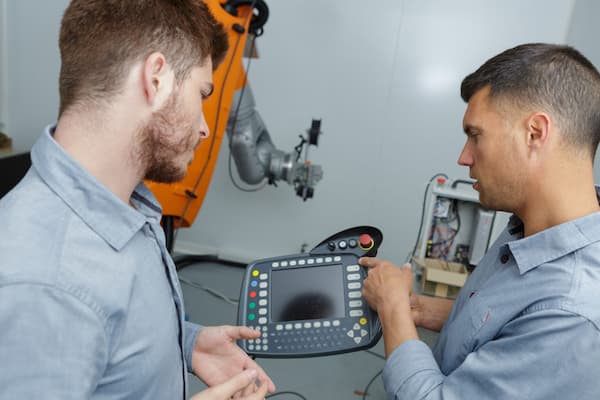News and Events
The robotics industry is constantly changing and evolving. New robotics technologies and developments in automation are quickly creating exciting career opportunities at every education level – from micro-credentials to PhDs. Here is where you can learn more about robotics careers in manufacturing and how these new technologies are benefiting workers


NEWS
What Are New-Collar Careers and How Do I Get One?
December 30, 2020Whenever you hear people talking about careers, you may hear them refer to various types and colors of collar that define a job role. This started in 1910 when a newspaper referred to some workers as “white-collar” in contrast to the manual labor of life on the farm. The classification of laborers as “blue-collar” followed shortly after, due to the prevalence of denim and blue canvas clothes worn by men and women in the more industrial, factory-focused environments of the early 20th century.
What’s a New-Collar Job?
The number and color of collars have increased in recent years, such as “pink-collar” which indicates service workers, and “green-collar” for jobs that focus on environmental work. One of the more recent terms is “new-collar,” which encompasses a range of skilled, technical positions like those who work in robotics. These are distinct from traditionally white-collar jobs careers in that new-collar workers typically get hands-on right on the shop floor right after tapping code into a computer terminal. These professionals are also different in that they come to their careers through unconventional and, often, non-linear paths.
As they’re a relatively new field, as the name would imply, the creation of distinct paths to a new-collar career is an important facet of this website’s existence. Many current professionals with new-collar careers ended up in the field due to a good blend of experience and education in fields related to robotics and engineering, rather than preparing for it specifically in the way that most college majors work. We’re working toward changing that, creating a resource to help new-collar job seekers find the robotics careers that suit their skills and preferences by connecting them with the proper training and education that prepares them for a new-collar job in the manufacturing sector. If you’re interested in what this new track looks like, be sure to explore our resource on robotics career paths.
Do I Need a College Degree to Get a New-Collar Job?
The answer to this question is: absolutely not. You do not need a traditional secondary education to get a new-collar job. While undergraduate bachelors’ and even graduate degrees are often associated with white-collar jobs, the same does not necessarily hold true for new-collar careers. Many of the skills needed by a worker in a new-collar job are gained through on-the-job training, vocational training, or other nontraditional learning pathways. All but the highest level of robotics workers rarely need more than an associate’s degree or technical certification in order to get a job in the new-collar sector.
Soft Skills Are Important to New-Collar Careers
One of the main differentiators between a new-collar worker and a blue-collar worker is the technical dimension, but this does not mean one can ignore the importance of soft skills in pursuing a robotics career. The ability to analyze a situation with clarity, attention to detail, and a strong work ethic are all valued highly by robotics employers. You can have a world-class education from the best schools, but if you’re not a good communicator or willing to find new ways to solve a problem, you won’t get very far in robotics.
How Do I Get a New-Collar Job in Robotics?
The nontraditional nature of a new-collar job means it’s impossible to identify a single path into the new-collar fields like robotics. The best way to chart a course into robotics is to identify a milestone or two, like an eventual point you’d like to reach in your career, and pursue the opportunities that can help you reach those milestones. If you are interested in managing fellow robotics workers while still engaging in the work of maintaining and fixing robots, then you’ll want to make sure you’re taking the necessary steps toward both being a good manager and a good robotics technician.
With the rising costs of traditional education and the need to reinvigorate the domestic manufacturing ecosystem, new-collar jobs are going to be more important than ever. Keep an eye on www.roboticscareer.org for the latest news and ways to chart a robotics career.


